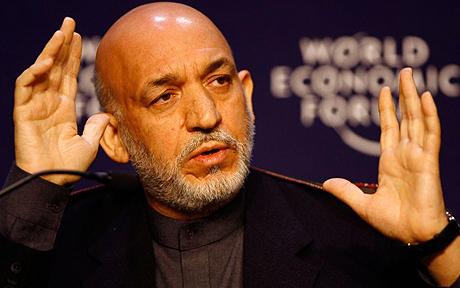ROUNDUP: Afghan election commission rejects Karzai early-vote call
 Kabul - Afghanistan's Independent Election Commission on Wednesday defended its decision to set August 20 as the date for the next presidential election, rejecting President Hamid Karzai's decree for early polls in April as simply too soon for the country to prepare for.
Kabul - Afghanistan's Independent Election Commission on Wednesday defended its decision to set August 20 as the date for the next presidential election, rejecting President Hamid Karzai's decree for early polls in April as simply too soon for the country to prepare for.
Karzai last week ordered the commission to move the polling up to comply with the constitution, sparking an outcry from politicians who said they were not ready for an earlier election date.
Karzai's move was rejected by his government's backers - including the United States, NATO military alliance and the United Nations - who argued that an election next month was not possible because of poor weather and security and logistical problems.
"The climate, security, budgetary and operational challenges have not yet been solved," Azizullah Ludin, the head of the Independent Election Commission, told reporters in Kabul.
The commission "is preparing to conduct transparent, fair, secret and general elections, which will be acceptable to the people of Afghanistan and the international community and legitimize the system, based on the previous decision," Ludin said.
The Wednesday' decision was welcomed both by Karzai opponents, as well as the international community, including NATO and UN, which have kept relatively quiet in order not to be seen as overly interfering in Afghan domestic politics.
Moments after the announcement, almost all opponents of Karzai's government, including several, who announced their intention to run for president, gathered in one of the city's hotels to declare their support for the summer voting date.
Both UN special envoy to Afghanistan Kai Eide and the top commander for the NATO-led International Security Assistance Force in Afghanistan US General David McKiernan welcomed the decision.
"This (later) date will provide the time needed for the IEC with the support of the international community to make practical and logistical preparations for candidates to campaign, and for Afghan and international forces to provide security," Eide said.
McKiernan, who commands more than 50,000 NATO-led forces and another 18,000 independent US-led coalition soldiers also said, "National elections held no earlier than 20 August will allow ISAF to provide the right security conditions in support of the ANSF (Afghan National Security Forces)."
NATO military officials had indicated in the past that summer election would enable them to deploy an additional 17,000 US troops, expected to arrive in the country in the next few months, in different parts of the country to help with the security of polling day.
Other countries with the North Atlantic Treaty Organization had also said they would increase the number of their soldiers during the elections.
Although Karzai justified his weekend decree by referring to two articles of the constitution that leave the president with certain authority and responsibility to ensure the implementation of the country's supreme law, many of his opponents accused him of trying to play a political game to wrong-foot other candidates.
The opposition groups said that Karzai as a president could use all government resources to campaign for his re-election, while other contenders would not be able to reach out to the Afghan public if elections were to be held in April.
However, despite being widely welcomed, the August election date would create a potential constitutional and political crisis in Afghanistan.
According to the constitution, Karzai's term expires May 22 and elections must be held 30 to 60 days before that date.
Karzai's opponents have also warned that they would not recognize him as the legitimate president if he remained in office after the expiration of his term.
Afghan and international monitors said they fear that Afghanistan's fragile democracy would be paralyzed unless a consensus is made among political powerbrokers on who would rule the country after May 22.
Sources said that during their meeting on Wednesday, the opposition groups discussed several options, including creation of a caretaker administration to take the power after Karzai's term ends.
Former finance minister, Anwar-ul-Haq Ahadi, who resigned from his post in Karzai's government earlier this year to run for the president told al-Jazeera English TV that the opposition group decided on Wednesday that Karzai could not lead the transitional government unless he withdrew his candidacy.
Karzai won in 2004 from a field of 18 candidates. The incumbent president has several times in the past few months indicated that he would run for another next term. (dpa)